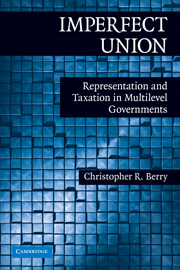Book contents
- Frontmatter
- Contents
- Preface
- Acknowledgments
- 1 Introduction: American Politics in 3D
- 2 What's Special about Special-Purpose Governments?
- 3 A Political Theory of Special-Purpose Government
- 4 Piling On: The Problem of Concurrent Taxation
- 5 Specialization and Quality
- 6 Governing the Fiscal Commons
- 7 Conclusion
- Methodological Appendix
- References
- Index
- Title in the series
3 - A Political Theory of Special-Purpose Government
Published online by Cambridge University Press: 05 June 2012
- Frontmatter
- Contents
- Preface
- Acknowledgments
- 1 Introduction: American Politics in 3D
- 2 What's Special about Special-Purpose Governments?
- 3 A Political Theory of Special-Purpose Government
- 4 Piling On: The Problem of Concurrent Taxation
- 5 Specialization and Quality
- 6 Governing the Fiscal Commons
- 7 Conclusion
- Methodological Appendix
- References
- Index
- Title in the series
Summary
Despite being the most common form of local government in the United States, spending more than all city governments combined, and having more civilian employees than the federal government, special-purpose governments have received precious little attention from scholars. Perhaps most surprisingly, no one has ever produced a theory of the politics of local special-purpose government. Fortunately, such a theory need not be constructed from whole cloth, for these local institutions bear a family resemblance to other, more familiar institutions of specialized jurisdiction, such as congressional committees and parliamentary ministries. In this chapter, I build a model of special-purpose government that is grounded in modern theories of political economy. I begin with a basic model of interest group competition with probabilistic voting (e.g., Hettich and Winer 1999; Persson and Tabellini 2000, ch. 7). I introduce two novel elements to the model: First, I allow for the existence of multiple independently elected governments, each providing a different public good; second, I allow for selective participation by the interest groups in the election of each government. Throughout, my emphasis is on understanding how outcomes differ when policy is made by one general-purpose government compared to multiple overlapping single-function governments.
The central intuition of my theory is that removing a policy issue from the purview of a general-purpose government and placing it under the jurisdiction of a single-function district enables the interest groups concerned with the issue to increase their influence over it.
- Type
- Chapter
- Information
- Imperfect UnionRepresentation and Taxation in Multilevel Governments, pp. 51 - 88Publisher: Cambridge University PressPrint publication year: 2009



